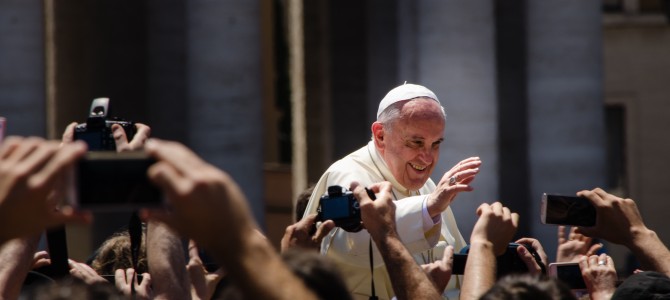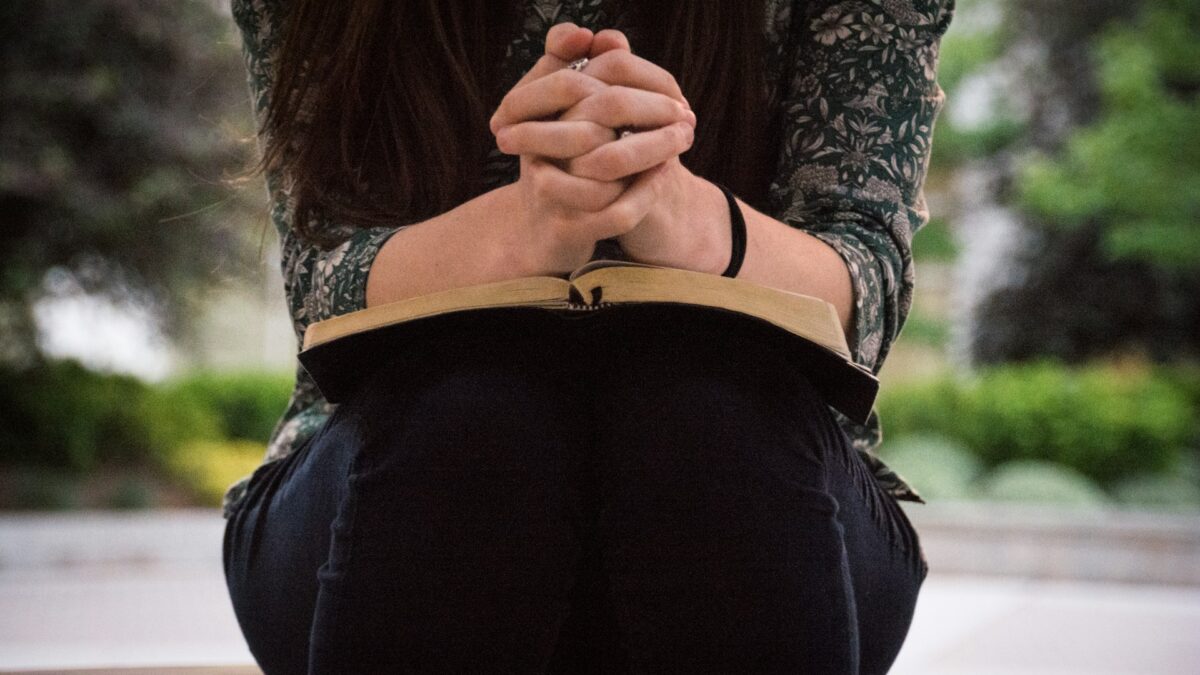
Pope Francis is rolling into town, and that means we’ll be hearing plenty of pope talk. As a preview of coming attractions, allow me to paraphrase the vast majority of what will be said:
“I know very little about Catholicism or Pope Francis, but I don’t like feeling left out of the conversation, especially because I have a vague, general interest in religion and/or spirituality. To prove my expertise, I found something dumb the pope said once, and I’m going to rant about it. Alternatively, I may express the wild hope that the Supreme Pontiff of the Catholic Church will have a moment of temporary insanity in which he decides to agree with me about X, even though my views on this are wildly incongruous with the teachings of the Catholic faith.”
There! You may now safely disregard 80 percent of what people write about Pope Francis over the course of his visit to the United States. Now, in the spirit of Franciscan mercy, take the time I’ve saved you and go help a kitten out of a tree.
Who Is This Guy?
As a Catholic, I suppose I should be flattered. The Archbishop of Canterbury practically has to start issuing fatwas before anyone reports on his activities. And what does the Mormon prophet think of the situation in Palestine? Nobody cares. The Roman Pontiff, by contrast, is always news, and on one level that makes perfect sense to those of us who rest in the untroubled assumption that Rome is where all roads lead. By chattering endlessly about the pope, the world does implicitly acknowledge his specialness.
At the same time, to serious Catholics, the actual discussion that takes place is mostly irrelevant and irritating. Most mainstream commentators want to say something about the guy in the white hat, but they have trouble getting a handle on such a unique world celebrity. He doesn’t quite fit any of the usual categories. Should they discuss him like a politician? A distinguished writer or scholar? A popular cult figure, more in the mold of a Beyonce or a Peyton Manning? It’s so hard to figure this out.
Conservatives nowadays are somewhat cranky with Pope Francis, usually (in my opinion) for fairly silly reasons. They’re mad about his economics or his environmental ideas, or perhaps about some random off-hand remark concerning firearms or free speech. Everybody’s got a beef. That being the case, the balance of the coverage will likely be overladen with snark.
It’s understandable, but also kind of a shame. Pope Francis clearly is not an American conservative (surprise!), but it’s much better to have him around than not. As one who straddles the Catholic and conservative worlds, I rarely find the tensions to be that agonizing, and most of the irate commentary I read about the pope seems tone-deaf and somewhat shallow. I can forgive this, because the Catholic world is large and rich in nuance. But if this isn’t your fight, I would cheerfully advise you to pipe down. I therefore submit the following points, which you might keep in mind before you start running down the pope, either in print or around the water cooler.
Badmouthing Pope Francis Is Politically Stupid
There are many solid reasons for going easy the pope, but let’s start with the optics. I have addressed this before, so I will just reiterate briefly that American conservatives have nothing to gain, and everything to lose, by crossing swords with the pope. If we allow our compatriots to believe there’s anything intrinsically problematic about being a Catholic Republican, that could easily cost us at the ballot box. Taking shots at the pope is a fun change of pace from criticizing Democrats and airheaded celebrities, but the politics of it is much different.
Liberal Catholics like Damon Linker and Elizabeth Stoker Bruenig have been working hard to persuade American conservatives that yes! We are at war with Pope Francis. That’s a good clue that we probably don’t want to be.
Maybe You’re The Provincial One
People are always trying to patronize the Holy Father, explaining how he came from an Argentine backwater and is hampered by closed-minded clerics and reactionary religious teachings. Let’s try a thought experiment, reader. What if it turned out that you were the provincial one?
It’s always easy to quibble with an author or thinker who is coming from a dramatically different perspective or culture. Aristotle, cretin that he was, didn’t even understand gravity. Our Founding Fathers were mostly white, slave-owning males. And did you know that Jesus told his followers to pay their taxes, and criticized the rich? (What was he, some kind of statist? Very suspicious.)
That kind of cheap contrarianism comes at a cost. It can serve as a powerful shield against meaningful engagement with unfamiliar persons or ideas. This doesn’t just apply to the pope. I would make the same recommendation to anyone reading an important historical thinker (Plato, Shakespeare, Dante, Nietzsche) or even just befriending a person from a different culture. When we know that someone comes from a less-familiar perspective, we should tame our critical impulses for a period while we seek broader understanding. Otherwise, we’ll never be able to learn from anyone unless they’re exactly like us.
I don’t regard Pope Francis’ every word as gospel truth. (This, by the way, is not expected of faithful Catholics. The doctrine of papal infallibility is far more rarified than most people realize.) I do think it’s appropriate for all of us to be more circumspect concerning Bishop of Rome than we would be towards, say, an ordinary American pundit.
Yes, The Pope Is Special
Why assume that the pope has something worthwhile to say? Doesn’t that smack of slavish religious authoritarianism? Aren’t we opposed to that kind of thing here in America?
Actually, there are quite a number of things that make him unique. Let’s start here. The pope is effectively the only person on Earth who has a globally recognized mandate to take stock of the temporal and spiritual needs of the entire world. (Yes, I heard that contemptuous snort. “I recognize no such mandate!” Very well, then. Please make sure to balance all your missives on Pope Francis with an equal number on the views of the Archbishop of Canterbury, the Iranian Ayatollahs, and the Mormon prophet. Go.)
Of course, the pope is still a man, and as a man he has his prejudices and blind spots. Nevertheless, he has been appointed (remember: popes never officially run for office) to a very big job. He has no formal allegiance to any major nation-state. Once instated, he has no further elections to win. This is really as close as we can get to an authority with “unbiased global observer” status. It’s no wonder the world is perpetually fascinated by head of the Catholic Church.
It gets better. Although not bound by national allegiances, the pope is bound by allegiance to a long and vaunted intellectual tradition. Even if you don’t believe (as I do) that the Holy Spirit protects the Holy Father from heresy, you can at least appreciate that he has very strong motivations for honoring that lengthy legacy.
Since the Catholic intellectual tradition is one of the bulwarks of Western Civilization, that makes for a pretty substantial limitation on what he can say. It’s the sort of constraint that should interest political and cultural conservatives. To a much greater extent than any modern politicians, the pope is chained to a historical tradition. If only the Supreme Court took its precedents as seriously, America might be in much better shape.
Whatever else he might be, then, the pope is not just your standard political windbag. His position is quite unique, and his pronouncements on global affairs are also likely to be unique (at least viewed through the lens of our own particular political discourse). It’s worth taking some trouble to figure out what he’s saying, because even his mistakes may be instructive.
Questioning Authority Is Juvenile
From Martin Luther to Dan Brown, the pontiff has in many eyes been the Biggest Baddie on Earth, mainly just because he is the obvious representative of top-down institutional religion. If the world were to vote on which living person is most likely to be the Antichrist, I’m sure the pope (any pope!) would win. I often have the sense, when reading critiques of the pontiff, that some people still see him as their last licit option when it comes to mocking authority. With a kind of petulant glee, they seize upon any foolish or ill-considered papal remark and wave it around like a prize.
That might have made a certain kind of sense in the late Middle Ages, but at this hour of the day, isn’t it kind of juvenile?
The Vatican’s political reach is, at the present time, practically nonexistent. The number of people who would defer patiently to Pope Francis’ every command is surely very small. If you see Pope Francis as a bigger and more powerful (and still living!) David Koresh, you need to get a grip.
The Church Is Not The Enemy
I think Pope Francis is wrong about some things. At times, I respectfully express my disagreement, in discussion or in print. But anyone who is even loosely on the side of tradition should recognize that the Catholic Church is an ally, not an enemy, and it’s much better to have figures like Pope Francis than to not.
Pope Francis regularly rails against the evils of abortion. He promotes the goods of marriage and family. He denounces the evils of eugenics and social engineering, and yells at interviewers that gender ideology is demonic. What other major world figure could get away with this and still get a hearing in the mainstream press? Pope Francis encourages us to return to the wisdom of our philosophical and spiritual Western forbears, for guidance and solace in a troubled time. He will go on doing this, because it’s his job, as the head of the Barque of Peter and the most recognized spiritual leader in the world.
If you feel that all this Catholic talk is out of your depth, it is of course permissible to remain silent on the subject of the pope. Sulkiness, however, is unbecoming. In all the most important ways, Pope Francis should be seen as an ally by anyone who is interested in preserving what is left of Western Civilization.









